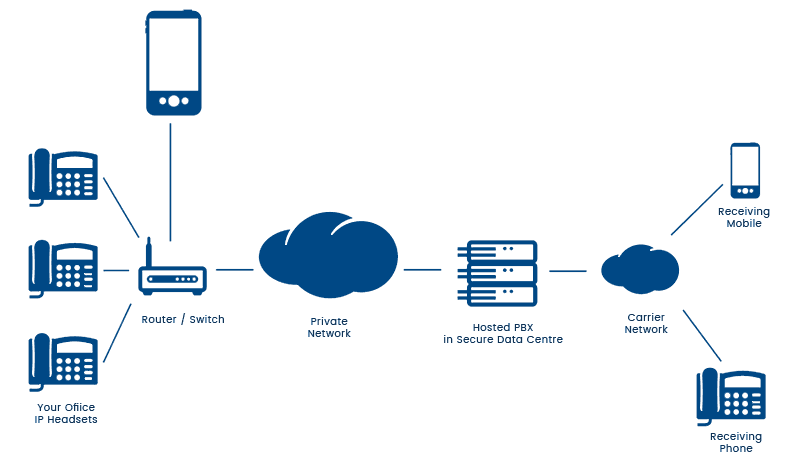How Cloud Phone Systems Are Transforming Business Communications
If you’re starting a new business or are looking for a technology to help streamline the way you connect with your clients, BTPVoice has a solution with their voice over internet protocol (VoIP). If you’re unfamiliar with VoIP and don’t know exactly know what it is, in today’s post we’ll break down and demystify VoIP.
At BTPVoice, we want to see your business flourish and we’re here to play a small part in helping you get there. Connecting with your customers is, arguably, one of the most important components in running your business. Learn more about VoIP and how it can keep you connected.
The Basics of VoIP
VoIP is a communication solution and is a part of a body of technologies based over an internet protocol (IP), and when your business implements VoIP, a VoIP-equipped phone is necessary for the system to function properly. These phones connect to an IP network utilizing either the ethernet or a Wi-Fi connection.
VoIP initially began as a private based network for users to make long distance calls from their computers with the inception of the Legacy Telephone Network, and second-generation companies such as Skype. Gradually, the technology was adapted for business and corporate use as companies began moving from traditional landlines with copper wiring to internet-based calls.
VoIP has revolutionized how businesses connect with their clients, streamlining features that assist in productivity.
Because VoIP can run both voice and data across a single network, costs are significantly reduced.
What Are the Differences Between VoIP and a Traditional Landline?
A landline operates on a solid core that incorporates physical copper wire and plugs that connects to a wall jack. Landlines are based out of analog technology that sends exchanges through switch boxes that connect the two calls.
A VoIP allows users to place and receive calls over the internet and do not use copper wiring or wall jacks to secure their connection. VoIP instead uses the same internet that computers and routers are based from. VoIP phones turn calls into digital signals within the actual phone and lean less on the physical exchanges that a landline uses.
A VoIP requires a reliable, high-speed internet connection for an optimal connection and is able to offer a variety of features to help businesses be more productive and dynamic, while a traditional landline can only make and receive calls.
As we touched on above, the features of a VoIP phone system are much more comprehensive than a landline. You are not only able to make and receive calls but you’re able to send a voicemail to email, call conferencing, have a virtual receptionist, send and receive faxes to mobile devices, and much more.
Because VoIP technology is becoming the norm is business practices, it’s commonly used and a new standard in how businesses communicate with their clients. As a result, most traditional phone companies are on board and committing to building a digital infrastructure as the technology progresses.
Some companies are concerned with the reliability of VoIP compared with a landline and what happens if the connection fades or drops, however, as internet technologies continue to improve so do the VoIP systems! Businesses are thrilled with the offerings of VoIP and hardly experience any issues. It’s always important to dialogue with your internet provider to choose the best plan that offers the most reliability.
The cost of VoIP compared with a landline is noticeably cheaper because you don’t have the maintenance costs or fees for things like long distance calling.
What Are The Advantages of VoIP?
As VoIP technology continues to progress, the ease and reliability are making VoIP an advantageous choice for small business owners.
VoIP is Almost Maintenance Free!
As a growing business, it’s hard to predict where you’ll be in a year. Adding landlines can be expensive and difficult to maintain especially if you’re growing at a rapid rate. Keep this simple and maintenance-free by making it easy to add lines inexpensively. And, lines are just as easy to remove if you have an employee quit or decide you don’t need as many lines.
Portability
If you have employees who work remotely or travel a lot, VoIP phone numbers can stay with them as they move around. Calls are easily diverted to whatever location they’re in as a result of the cloud-based VoIP accessibility and features.
Old Technology is Supported
Faxes are still sent on clunky old machines and some may still even use dial up! A great advantage of VoIP is it supports old, outdated technology like faxes, but it features virtual faxing that sends faxes to your mobile devices so your business can still remain paperless to support the environment.
Save Money with a Hosted VoIP
In the initial stages of VoIP technology, the systems could be costly and reconfiguring the system was intrusive and required a lot of maintenance and repairs. When you opt for a hosted VoIP system, you save money on international calls and also on the initial cost of installation.
VoIP With BTPVoice
If you’re pondering a VoIP system and needed more information, we’ve covered the basics on VoIP, the differences of VoIP compared to a landline, and the advantages of a VoIP for your small business.
VoIP will change the way you connect with your clients and will give you the ability to streamline your business’ productivity to foster growth. At BTPVoice, we’re here to assist you in every stage of growth — from your first VoIP phone system to a VoIP phone for your first one hundred employees. Call us today and start building a better connection.












